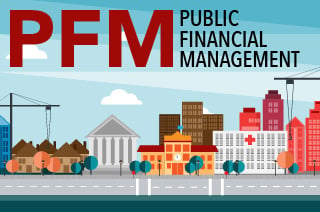Training Program

Public Financial Management (PFMx)
Deadline passed
Session No.: OL 21.128
Location: Course conducted online
Date: May 1, 2021 - April 15, 2022 (50 weeks)
Delivery Method: Online Training
Primary Language: English
Interpretation Language: English
Target Audience
All government officials and staff from development agencies. The course is particularly relevant for mid-level to senior officials in ministries of finance, treasuries, debt management offices, ministries of economy, or financial planning divisions in line ministries. It is also targeted at officials involved in capacity strengthening functions related to public financial management (PFM). If you are not a government official or staff from a development agency, please register at edX.org.
Qualifications
The training is designed for participants who already have a basic understanding of PFM systems and builds on that knowledge at an intermediate level. Basic understanding of PFM systems would be helpful. Access to a computer with a reliable Internet connection and a Google Chrome web browser is essential.
Course Description
This online course, presented by the Fiscal Affairs Department, provides an overview of PFM systems, institutions, and capacity building in developing and emerging market economies. It focuses on PFM issues in support of macroeconomic stability, inclusive growth, and achievement of the Sustainable Development Goals (SDGs). The training covers a wide range of topics and treats PFM as an integrated system rather than a collection of specialties. As such, it focuses on PFM priorities, reform objectives and implementation risks. The course is built on conceptual and practical approaches, and includes testimonials from ministers of finance, practitioners, and other stakeholders from many countries.
PFMx requires 40-50 hours of work. It is designed in 5 Parts, requiring about 8 hours of work each. It can be taken entirely at your own pace over a period of one year.
Course Objectives
Upon completion of this course, participants should be able to:
- Explain why PFM is an important tool to implement public policies.
- Describe and analyze the budget cycle and its main components.
- Describe a simple medium-term budget framework, a cash management plan, and a public investment management reform strategy.
- Identify tools for the effective management of fiscal risks, components of fiscal transparency, reliable fiscal reports, and internal and external audits.
- Identify issues relevant to the prioritization and sequencing of PFM reforms, and the challenges faced in implementing such reforms.
- Explain how civil society, public participation, and supreme audit institutions keep governments accountable.
- Describe the role of local conditions and political institutions in designing and implementing reforms.
Foreign Borrowing and Loan Negotiation
English | February 23-27, 2026 | In-person Training | New Delhi, India
Apply online by February 9, 2026
Safeguards Assessments of Central Banks (SAC)
English (French, Portuguese) | March 23-27, 2026 | In-person Training | Ebene, Mauritius
Apply online by February 13, 2026


